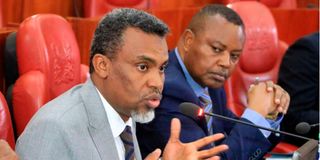DPP Haji wins prosecution war with DCI Kinoti

Director of Public Prosecutions, Noordin Haji (left) and Director of Criminal Investigations George Kinoti.
The High Court has ended a tug-of-war between the Director of Public Prosecutions Noordin Haji and Director of Criminal Investigations George Kinoti over who has the powers to file criminal charges.
Justice Weldon Korir ruled on Thursday that the DPP is the only one mandated by law to make the “decision to charge” in court, bringing to a halt a long-standing feud between the two offices.
The judge said the Inspector-General of Police does not have the authority to institute any criminal charges.
He also observed that police have no powers to draft charges against a suspect and file in court without the authority of the DPP.
The judge made the declaration while ruling on a petition by rights activist Okiya Omtatah, who sought guidance on who between the National Police Service and the ODPP has the mandate to charge suspects in court.
The petition was triggered by a supremacy war between the two constitutional bodies over charging of criminal suspects.
The dispute escalated in March 2020 when the police arraigned former Kenya Ports Authority (KPA) boss Daniel Manduku and Kenya Revenue Authority (KRA) Commissioner for Customs and Border Control Kevin Safari over graft-related accusations.
Charge suspects in court
They were released by the magistrate’s court in Milimani, Nairobi, after a state prosecutor said there was no file and that the ODPP was not aware of the charges. Mr Omtatah argued that the DPP had usurped the constitutional and statutory powers of the police to investigate crimes and charge suspects in court.
He had urged the judge to quash the ODPP’s 2019 Decision to Charge Guidelines, which were developed with the aim of protecting Kenyans from false charges and trial of poorly investigated cases.
The policy was also billed as a document to equip state prosecutors with independence and allow them to objectively exercise their role as gatekeepers in the criminal justice system.
The petition involved the relationship between the NPS and the ODPP in as far as the decision to charge is concerned. Mr Omtatah argued that decision to charge is the mandate of the police and not the DPP.
It was his further contention that the DPP has no mandate to direct the IG to investigate any particular offence or offences. The DPP can only direct the IG to investigate any information or allegations of criminal conduct, he stated.
But Justice Korir ruled that the guidelines are constitutional and valid. He added that the DPP has powers to direct all investigative agencies, such as the DCI, to conduct investigation.
The court added that the DPP has powers to guide and assist investigative agencies. Judge Korir said the DPP not only has powers to direct the IG to conduct investigations but also to expect and receive a report of the same.





